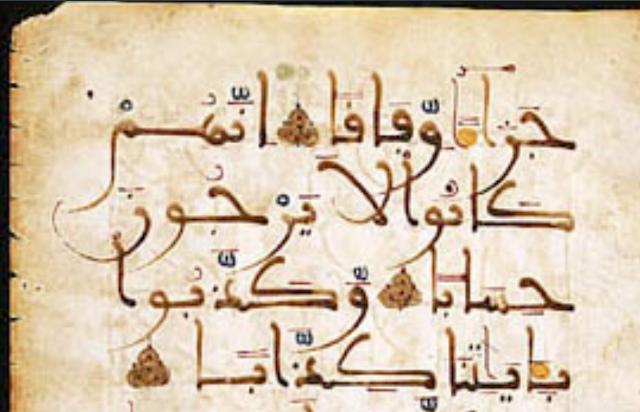This is the story of a
multi-billion-dollar business opportunity that someone saw, pursued
admirably, and... then wasted by hasty
inattention to quality.
Poof. The multi-billion-dollar opportunity was never regained by anyone
in that entire part of the world for hundreds of years after. It's a
fascinating tale.
As Angela Nuovo, the scholar who located the lost Koran in a Venetian monastery*, in 1987, said,
The story of this Arabic Koran is the thoroughly Venetian story of a
sector, the printing business, that was productive, ingenious, intensely
dynamic, inasmuch as it was driven by unbridled competition... Imagine
the huge business potential represented by such a numerous and
profoundly religious readership. And that explains how, with its
geographical position and its history, Venice was the only place where
such an enterprise could have been undertaken."
*The monks did not know what they had. The book had been virtually
untouched in the archives for centuries, written as it was in Arabic.
Angela Nuovo was a young scholar when she found it (with the help of a
male colleague -- the monks wouldn't let her in the all-male domain, but
she described its location to Professor Giorgio Montecchi and he went
to Venice with her to find it -- right where she had guessed it would
be. Nice sleuthing!).
Venice was
the hot spot for the printing press. Hotter than
Germany, where it was invented, for a few reasons: Venice had access to
trading partners all over the world, buckets and buckets of money, and a
large, curious, intelligent, wealthy population with one of Europe's
highest literacy rates.
Venice had close ties with both the east and the west. Venetian ships
travelled to Ottoman lands as much (or more) as they travelled to
European destinations.
So it's no surprise that an enterprising businessman came up with the
idea to publish a Koran with the new miraculous printing technology.
Anyone could see the magnitude of the Muslim market. Alessandro Paganini
was the son-in-law of the first printer to created printed works with
the Cyrillic alphabet. Certainly he had the lineage and training for
adventurous printing endeavours. And so, he spotted an excellent
potential market and went about creating printing plates for the Koran
in script Arabic.
As Alessandro Marzo Magno says in
Bound in Venice,
The capital invested must have been remarkable. The engraving of the
characters probably took years and no doubt required at least one Arab
compositor and an Arab proofreader, of which there was no shortage in
Venice...
This was a book of remarkable quality, printed on quality paper and from characters executed with refined engraving.
The first printed version of the Koran was published in Venice in
1537. If his marketing plan to sell Korans to the Ottoman world had gone
well, Paganini would have become fabulously wealthy (a common enough
thing in Venice). As it is, he went fabulously bankrupt by 1538.
His mistake? There were some
proofreading errors.
The Koran is a sacred book, which already had a centuries-long tradition
of hand scribing, verbal memorizing, and perfection. The religious
leaders who
could have made Paganini wildly wealthy if they had
approved his printed Koran, instead blackballed it. At the time, the
belief was that the holy book of Islam must be written by the hand of an
expert Islamic scribe, and for one error, the scribe could actually,
really, lose his head.
The Paganinis should have hired a second proofreader. All those years
of effort and capital investment, down the drain for a small economy
made in the final stages. Did you know? Publishing houses these days
often have several layers of editors for one published book. When
quality matters, polishing is worth the investment.

Would you have been the businessman who published the Koran
with errors in it, just to get it out on the market? How tolerant are
your clients, really, with errors that you might find trivial?
Consider hiring an editor (someone like me) to give your writing a
read sometime and let you know how you're doing. Everyone can use an
assessment now and then (professional writer/editors like me get edited
all the time. It's my experience that the high-end people in a company
do, too). Learning about your own writing and how you might improve it
is a good way to move to the top.
Note: I used the spelling "Koran" as used in the book below. Thank you to Saeed Doroudiani for the following cultural note:
"The correct spelling for the Arabic name of the Holly Book is
Ghoraan, which is also written as Quran. The pronunciation of the word
Koran doesn't fit, so incorrect."
Resource: "
Bound in Venice: The Serene Republic and the Dawn of the Book," by Alessandro Marzo Magno, Europa Editions, 2013.







Comments
Post a Comment